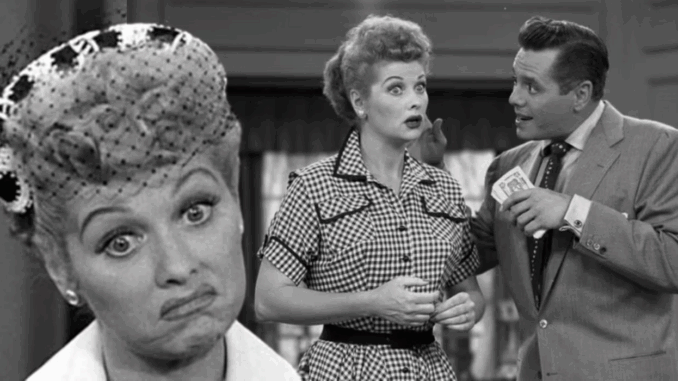
‘I Love Lucy’: Lucille Ball’s Success Is In Making the Unbelievable Believable
In the annals of television history, few names shine as brightly as Lucille Ball. As the star of (1951–1957), she created one of the most enduring, influential, and beloved sitcoms of all time. The genius of the show—and the enduring legacy of Lucille Ball—can be distilled into a single, paradoxical concept: her unparalleled ability to make the unbelievable believable.
Lucy Ricardo, the character she perfected, was a tornado of misplaced ambition, outlandish schemes, and magnificent failures. She got stuck in a large, earthenware jug, was flung around a winery while stomping grapes, and nearly ruined a television commercial by unknowingly consuming a high-alcohol-content health tonic. These scenarios were, by any logical measure, absurd. Yet, in the hands of Lucille Ball, they never felt like cartoons; they felt like the tragicomic, desperate reality of a woman utterly committed to an impossible goal.
The Art of the Absolute Commitment
The key to Ball’s success was her profound commitment to every outlandish premise. Unlike many comedians who rely on a wink and a nod to signal the joke, Ball immersed herself so completely in Lucy’s ill-conceived plans that the audience, for a fleeting moment, forgot the ridiculousness of the situation.
This required a painstaking, almost athletic dedication to her craft that defied the “ditzy” persona of her character. Lucille Ball was a perfectionist and a workaholic who spent hours rehearsing every physical antic, every precise facial expression, and every syllable of dialogue.
A Masterclass in Physical Comedy
Ball’s success wasn’t just in her delivery of a line; it was in her mastery of physical comedy, placing her in the comedic lineage of silent film giants like Charlie Chaplin and Buster Keaton. She was not afraid to abandon the glamour of a Hollywood starlet for the sake of a laugh:
- The Grape Stomp: In “Lucy’s Italian Movie,” Ball’s commitment to the mud-wrestling-style fight with a fellow worker in a vat of grapes is legendary. It’s an unscripted, chaotic eruption of physical energy that elevates a simple scene into a piece of pure, frantic spectacle.
- The Chocolate Factory: Her wide-eyed, desperate struggle to keep up with the conveyor belt of chocolates is a ballet of panicked futility. The sheer panic in her eyes is so genuine that the audience doesn’t see a rich actress; they see a working woman terrified of failure.
By executing these improbable stunts with such unflinching dedication and physical precision, Ball grounded the absurdity. Her pain, confusion, and growing desperation were palpable, making the audience invest emotionally, not just humorously, in the scene. The unbelievable became believable because Lucy believed it.
Grounding the Absurd in Relatable Truths
While the events surrounding Lucy were often surreal, the emotions driving her were profoundly relatable. Lucy Ricardo was not simply a scatterbrained housewife; she was a woman driven by a universal desire for self-actualization, validation, and a life outside the confines of the kitchen.
Her core motivations always revolved around three simple, human truths:
- The Desire for Fame: Lucy constantly yearned to be in Ricky’s show, to escape her role as a homemaker, and to prove her talent. This desire resonated deeply with the changing role of women in 1950s America.
- The Fear of Missing Out: Whether she was trying to keep up with a fast-paced job or hide a minor mistake from Ricky, Lucy was constantly fighting against a feeling of inadequacy.
- Unbreakable Love: Crucially, her wildest schemes were often attempts to please her husband, her friends, or simply make her mark. When Ricky would inevitably discover her “splainin’ to do” moment, the underlying affection between the couple ensured that the joke never turned truly mean.
Lucille Ball used her magnificent eyes, which could convey everything from pure mischief to genuine terror in a fraction of a second, to communicate these deeper emotions. This infusion of genuine pathos into the slapstick made the improbable feel earned.
A Pioneer in Production: Making Real Art
Ball and her husband, Desi Arnaz, understood that for the unbelievable character of Lucy to thrive, the show’s production had to be rock-solid and meticulously crafted. Their revolutionary contributions ensured the comedy was captured with a cinematic quality that elevated the entire medium:
- The Three-Camera Technique: Arnaz’s insistence on using three cameras filming simultaneously allowed the show to be shot live in front of a studio audience with fluid, uninterrupted action. This meant the physical comedy was captured from multiple angles and the performances were energized by real-time audience laughter. This technique is now the standard for multi-camera sitcoms.
- Filming on 35mm Film: This decision, unprecedented at the time, was expensive but crucial. It resulted in high-quality prints that made syndication (reruns) possible, cementing as a perpetual presence on television and a lucrative business empire.
By adopting Hollywood film techniques for television, Ball and Arnaz gave their show a production value that matched the effort Ball poured into her performance. It turned a domestic farce into high-quality, timeless cinema, making the unbelievable scenarios look beautifully, undeniably real.
The Enduring Legacy
Lucille Ball’s triumph was in blurring the line between the zany and the heart-wrenching. She showed that a woman could be a complete physical comedian, a business trailblazer (becoming the first woman to head a major Hollywood studio, Desilu Productions), and a figure of immense warmth and relatability.
The genius of lies not just in the laughter, but in the lasting sense of connection. Decades later, when Lucy stuffs herself with bread to lose weight or dresses up like a Martian, audiences still lean in. They don’t see a gimmick; they see a desperate woman doing something extraordinary to solve a ridiculously self-imposed problem. Lucille Ball made Lucy’s absurd world feel like one we could all inhabit, proving that the most profound comedy is always rooted in the most honest, believable human drive.